- Original author: Jack, BlockBeats
Liberal paradise is turning to the right.
As if overnight, public opinion in Silicon Valley began to shift toward the Trump camp. After Kamala Harris became the predetermined presidential candidate of the Democratic Party, Silicon Valley became increasingly divided. Open support for Trump was once taboo in Silicon Valley, but now the blue bastion is shaken by frustration with Biden and the Democratic administration.
Over the past two years, Silicon Valley's tech giants have begun to participate in politics in a more high-profile way. Just like "software eats the world," these kingmakers are changing the power structure in Washington through capital and influence.
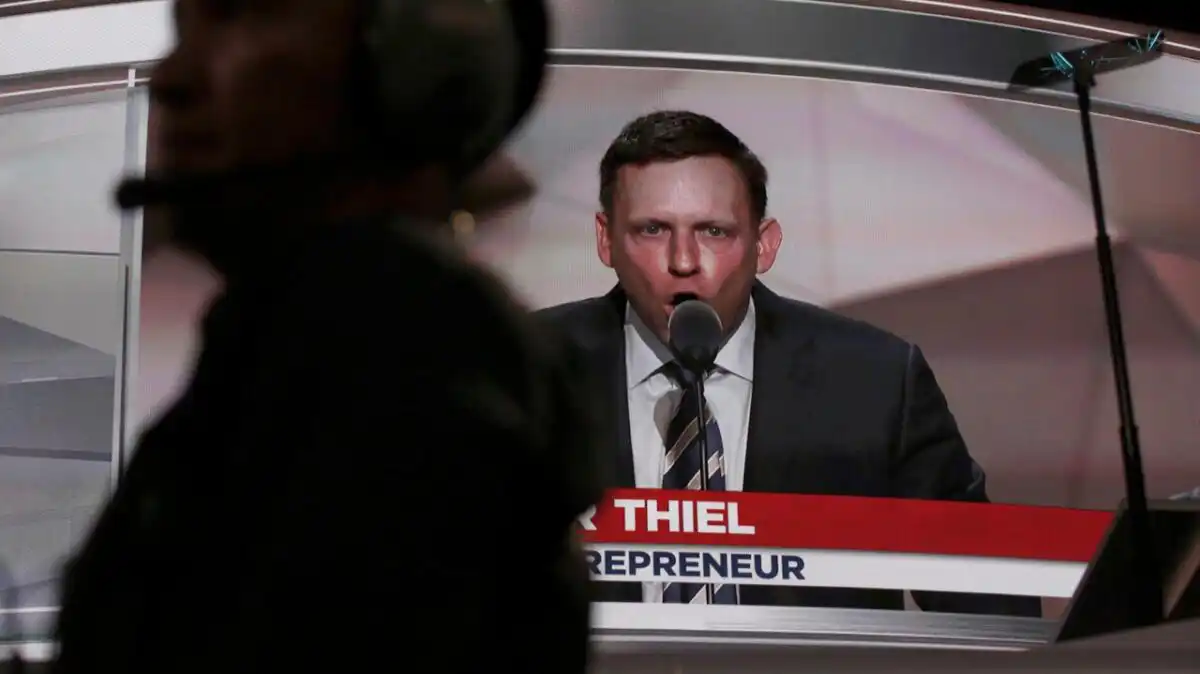
Table of contents
ToggleThe Great Contrarian and His Ultra-Trumpism
At the 2016 Vanity Fair New Enterprise Summit , Amazon CEO Jeff Bezos, who was present at the interview, was asked what he thought of Peter Thiel’s support for Trump. He replied: “You have to remember "Peter Thiel is a contrarian, and contrarians are often wrong." He then said that if it were him, he would not ask Peter Thiel to leave the Amazon board of directors.
Even in Silicon Valley, where everyone gathers, Peter Thiel is unique. His alliance with Mark Zuckerberg is known as one of the most powerful partnerships in the history of Silicon Valley, the "Paypal gang". Influence permeates every corner of the technology industry. However, in the summer of 2016, Thiel was caught in a "to-be-or-not-to-be" dilemma. He offended much of Silicon Valley due to his public and high-profile support for Trump. In the following four years, his relationship with Facebook's board of directors gradually deteriorated, and he finally left the social networking company in May 2022.
But this was not the end of Thiel. After leaving Facebook, he began to pursue another more hidden and radical power, and as an emerging political force, he expanded his influence from Silicon Valley to Washington. Through a series of efforts, he pushed his disciple JD Vance to the center of the political stage and became the main driver of Silicon Valley's "right-turn behind the scenes."
"The Contrarian"
In Silicon Valley, Peter Thiel has a more well-known nickname - The Contrarian. He almost always goes against everyone's views or at least is different, and then seizes the huge rewards in this non-consensus. Chance. In addition to founding PayPal, he was also the first external investor in Facebook, the godfather of Bitcoin in Silicon Valley, and one of the first people to invest in companies such as Tesla, SpaceX, and Airbnb. These investment objects were often not understood or optimistic in the early stages, but Peter Thiel would always appear in front of them immediately.
The secret of Peter Thiel's success is by no means simply "going against the trend." A philosophical thinking that runs through his life is that people in today's world no longer have real opinions.
While at Stanford, Thiel became angry and frustrated by the madness in the pursuit of cultural diversity on campus, and co-wrote a 250-page book with his friend David O. Sacks. The long book The Diversity Myth: Multiculturalism and the Politics of Intolerance at Stanford. In his book, Thiel criticizes Stanford's false diversity culture for diverting students' attention from truly important issues and passing some dangerous ideas to society through them. He accuses the campus of having a culture that seems diverse, but Actually everyone thinks the same way.

In Thiel's view, this is the fundamental reason for the bubble in American society , so when people believe in something without reservation, they should stay away from it as soon as possible. Based on this theory, Thiel sold Paypal on the eve of the dot-com bubble and subsequently successfully escaped the 2008 sub-credit crisis. Now, he tells people that popular technology trends are overrated, and entrepreneurs are better off thinking in reverse and staying away from buzzwords such as big data and cloud computing, because "fashionable" often means that many people are already doing the same thing.
When it comes to venture capital, Thiel opposes the lean entrepreneurial thinking of "running in small steps + idea validation", but advocates foreseeing the future through long-term thinking, because in this way you don't have to go through trial and error and think carefully before figuring it out. The conclusion is the trend. He claimed that 75% of the value of the technology companies invested by Founders Fund will come from the cash flow generated after 10 years.
In 2016, Peter Thiel once again found a rare opportunity to buck the trend.
For many years, Peter Thiel has served as a bridge between Silicon Valley and conservatives. At that time, left-leaning liberals were still the mainstream in Silicon Valley, and most employees of technology companies were supporters and donors of the Democratic Party. Thiel found that many Silicon Valley practitioners felt seriously offended by Trump's MAGA slogan. They felt that "Make America Great Again" was Trump denying Silicon Valley's contribution to promoting the development of American society, and Thiel It is exactly this kind of pessimism that I like.
For years, Thiel has favored more pessimistic presidential candidates . He dislikes and even despises the optimism of traditional politicians who, like Ronald Reagan, paint the United States as a shining city. Being optimistic only means that you are out of touch with reality." Thiel believes the days of great people accomplishing great things in government are gone and that today's federal agencies are "an old, center-left regime" that is constrained by rules and stifles innovation.
Trump's America is a fractured landscape by comparison, and in Thiel's view, MAGA is the most pessimistic campaign slogan America has had in a century because it acknowledges that America is no longer a great country, and for a For a presidential candidate, this is completely shocking. At that time, Washington was afraid of this political "outsider", but Peter Thiel chose to donate $1.25 million to him and spoke at the 2016 Republican National Convention to express his support.

The move put Thiel at odds with Facebook's Democratic board members and liberal employees, with some senior executives believing Thiel's political behavior had crossed a line. After the meeting, Thiel received an email from board member and Netflix CEO Reed Hastings, calling Thiel's decision a "catastrophic misjudgment."
However, in Thiel's view, supporting Trump is almost the "least contrarian" choice he has ever made. After all, it has been "recognized by half the country." Thiel has since grown increasingly distant from Silicon Valley, moving his home and investment firm to Los Angeles in 2018. Facts have proved that this great contrarian’s judgment on “Trumpism” was extremely prophetic, and his own bet on Trump also brought him huge political returns. Although this return It was not quite what he had originally imagined.
Trumpism Beyond Trump
In a media interview last November, Peter Thiel publicly expressed his "buyer's remorse" about the previous Trump administration and admitted that supporting Trump was a bad bet. Thiel told The Atlantic that he had imagined that the Trump administration would conduct a "national reckoning" after being elected and cut regulations and crush the administrative state before rebuilding the country, "but this is crazier and more dangerous than I imagined." Their (Trump administration's) inability to make the most basic branches of government work is even worse than my low expectations."
Peter Thiel has a soft spot for "outsiders." In his understanding, spoilers and subversives are almost always outsiders. This is the main reason why Thiel likes Trump. However, soon after Trump took office, he realized that this administration was not as radical as he expected.
During the 2016-2017 transition, Peter Thiel had an office in Trump Tower, where he presented Trump with a list of more than 50 Cabinet nominees for senior government positions. The purpose of this list is to " disrupt the administrative state ." Many people are either extreme liberals or outright reactionaries, making this list too radical even for the Trump administration.
One example was for the chief science and technology adviser position, where Thiel recommended William Happer, a prominent American climate skeptic who likened the demonization of fossil fuels to Hitler's treatment of the Jews. Ultimately, with the exception of his protégé Michael Kratsios, who was named chief technology adviser, few of Thiel's other candidates found jobs in the Trump administration. Soon after, Steve Bannon (former White House chief strategist), who was close to Thiel, was also kicked out of the White House.
According to Puck , Thiel’s relationship with Trump has been exaggerated by the media and Silicon Valley bystanders, but the fact is that Thiel was not among Trump’s core circle of business leaders at the time. Thiel has developed a good relationship with Trump's son-in-law, Jared Kushner, but his relationship with Trump himself is far inferior to that of Trump's longtime ally Tom Barr. Old money influencers like Tom Barrack or Robert Wood Johnson IV.
So Peter Thiel chose to sit on the sidelines as Trump campaigned for re-election in 2020.
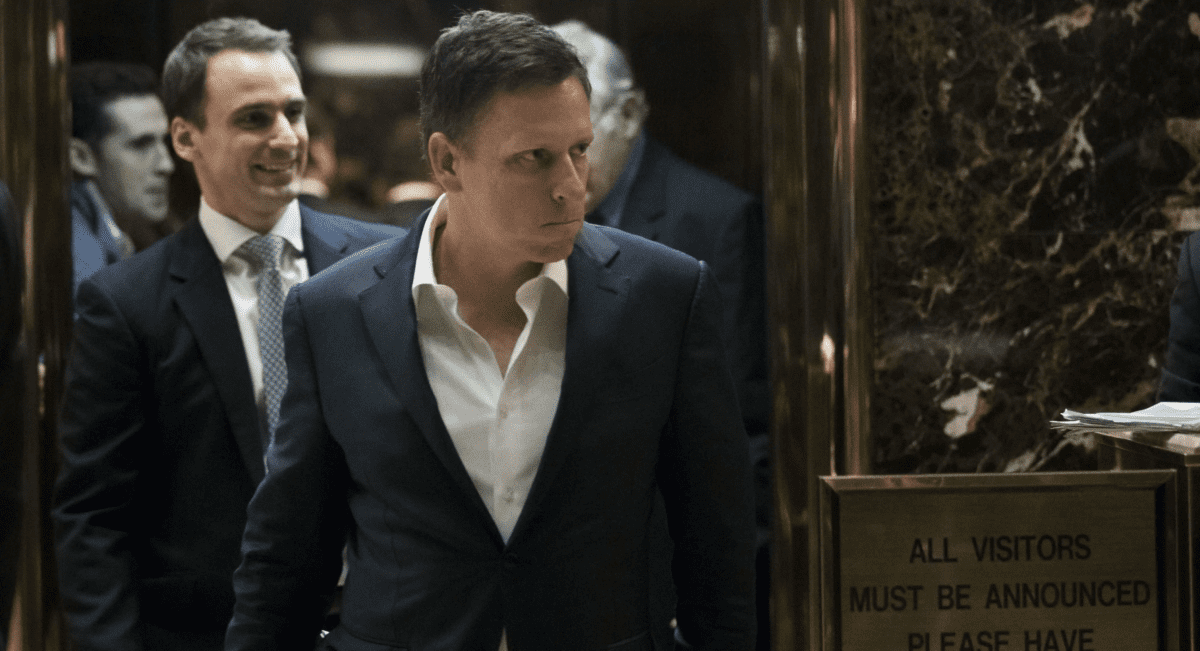
However, Thiel has not given up on the symbolic ideology behind Trump, that is, "Trumpism." This idea of anti-establishment and relying on radical subversion to achieve social reconstruction is what Thiel believes in, and he is willing to find a way forward and a reliable successor for this ideology, with or without the participation of Trump himself.
The good news is that Thiel's profile has grown significantly in conservative circles in the years since Trump won the White House, and the death of Republican big-money donor Sheldon Gary Adelson in early 2021 , and the arrest of Tom Barrack in the summer of the same year, further leaving a vacuum for Thiel to expand his influence within the party.
According to the New York Times , throughout 2021 and 2022, Republican politicians have been clamoring to visit Peter Thiel's home, or at least have a phone call with him. Republicans saw an obvious way out : Thiel could provide a "bailout" to struggling candidates, giving them enough money to fight off Democratic attacks.
According to Puck , Senate Republican leader Mitch McConnell has repeatedly asked Peter Thiel to rescue JD Vance and Blake Masters during the 2022 midterm elections. ) had disastrous performances in Ohio and Arizona, but was consistently rejected by Till. This confused McConnell, who didn't understand why Thiel spent about $20 million on the two men during the primaries, only to abandon his investment in the final election.
Thiel has his own reasons for taking a hard-line approach in the face of McConnell. In early 2022, he, Rebekah Mercer (heiress of the Mercer family) and others formed a covert conservative donor alliance called Rockbridge , aiming to "undermine and advance the Republican agenda" and try to gain political power in the party Reshaping the American Right Outside the Machine. Peter Thiel, the godfather of venture capital, certainly wants to win, but his goal is not to add another Republican seat, but to seek subversion . He hopes to push the Republican Party further to the right and purge establishment moderates. Either go bankrupt or redefine the industry, this is Thiel's investment philosophy.
After learning the lessons of 2016, Peter Thiel's political strategy has undergone a marked shift. He has begun treating candidates like a startup founder , spending large sums of money to support potential candidates early on. Thiel reportedly donated more than $20 million in the midterm elections and supported a total of 16 Republican candidates. As the godfather of Silicon Valley, Thiel copied the Paypal mafia rules in Washington. He accepted disciples and emphasized loyalty. With the expectation that the Republican Party would win more congressional seats, Thiel began to focus on installing loyalists in the party.
In the 2022 midterm elections, Peter Thiel’s two loyal disciples are Masters and Vance. The former is an executive of the Thiel family and co-authored with Thiel the Silicon Valley “Entrepreneurship Bible” “From Zero To One, the author of the best-selling book "Hillbilly Elegy" and a former employee of Peter Thiel's Mithril Capital.
In early 2022, the Washington Post Magazine detailed Vance's development from a well-known author to an extreme right-wing politician in a feature titled " J.D. Vance's Path to Radicalization ." From listening to Peter Thiel's "life-impacting" speeches at Yale, to working for Thiel's Mithril Capital in 2017, to founding Narya Capital with Thiel's funding three years later, Thiel has been involved in almost every step of Vance's development. Playing an influential role every step of the way.

In the final moments of the campaign, Vance enlisted the help of Thiel to win over Trump and win the Ohio race with a new infusion of $1.5 million from Thiel. By pouring "emergency political funds" into inexperienced right-wing protégés like Vance and Masters, Thiel ensured that they would be loyal to him, not McConnell, and in a sense, they were Thiel's. an extension of your ideology. One example is Facebook. After Thiel's Palantir was officially investigated by Facebook over the Cambridge Analytica incident in 2018, Vance's attack on Facebook was partly an effort by Thiel to push Zuckerberg to the right from the outside.
Unlike Elon Musk’s high-profile image on Twitter, Peter Thiel is a behind-the-scenes operator. He was once among the top ten chess players in the United States, and now he is even more adept at using his influence to deploy politics. chess pieces to achieve your goals. Many people underestimate Till's will and skill. As a descendant of German descent, his thoughts have a distinct German-Prussian color, which is cold, iron-blooded and even extreme. Thiel's influence does not come only from money. His ten-year brutal revenge against Gawk News is a serious warning he conveys to every enemy. In Silicon Valley, no one dares to say that he is not afraid of Peter Thiel. Now, he wants to use this iron power to change America again, even if it means losing his lifelong friend .
In 2022, the Washington Post pointed out in a report that Thiel and Musk heralded the rise of a new generation of technology tycoons. Their strong financial resources and unique ideologies are shifting from creating companies to reshaping a new generation of right-wing political leaders in the United States. And revolutionize the Republican Party and Silicon Valley. Two years later, Thiel was " extremely happy " that Vance had become the nominee for vice president, and just as Trump was said to have revolutionized the Republican Party, Thiel believed he had reinvented Trumpism. Perhaps in his view, the end point beyond Trumpism is Thielism.
Lord of the Rings Addict
Peter Thiel has always loved fantasy parallel worlds. He has read a lot of science fiction and fantasy novels since he was a child, but only "The Lord of the Rings" made him read it no less than 10 times (this is a three-scroll novel). long masterpiece). Thiel is obsessed with the Middle-earth continent written by JRR Tolkien. You can even say that he lives in his own fantasy world: whether it is Palantir, which he founded in 2003, or what he helped Vance found in 2020. Narya Capital, its name comes from the novel "Lord of the Rings".
Vivek Ramaswamy, the former CEO of biotech company Roivant Sciences, who founded an anti-ESG investment firm with Thiel’s support, told the media that Peter Thiel believed deeply in creating a parallel economy. The huge opportunity that lies there, and he believes that serving Americans dissatisfied with today's corporate America, will be the backbone of the next generation of big companies, is an opportunity that few are seriously pursuing.
In Thiel's eyes, these parallel economies are indistinguishable from Tolkien's Middle-earth: Middle-earth is an arena for ultimate power, where there is no government and people of extraordinary ability rise up one after another to realize their destiny. In addition, there are immortal elves here, who live in valleys protected by magical powers, far away from humans.
Peter Till is like a contender for power in Middle-earth, eager to get the One Ring that rules the world.
After the 9/11 incident, the United States comprehensively strengthened security measures and airport security checks became cumbersome. Thiel believed that it was ridiculous to reduce the efficiency of the entire society just because of one terrorist, so he hoped to use PayPal to identify online fraud. He used deception technology to locate criminals on the Internet in advance, so he founded the data mining company Palantir. The name and logo of this company are inspired by the "crystal ball of true knowledge" in the hands of the evil wizard Rudolf, which can observe and communicate with people and events in any corner of the world.
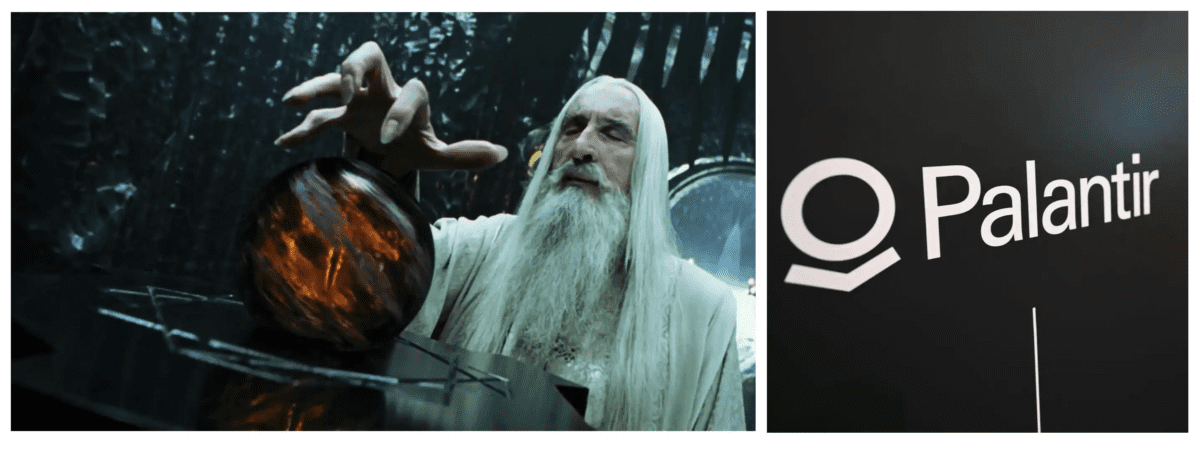
In the early stages, Palantir received support from CIA investment agency In-Q-Tel, and then lost out in competition with large rivals such as Amazon and Google. But Trump's taking office turned the situation around for Palantir, and they began to win a large number of government contracts . Due to his investment during the campaign, Thiel was able to lobby for his products in the US military. He once again applied PayPal's development model and integrated Palantir's Customers extend to government and secret service organizations around the world.
In a recent speech at Cambridge University, many audience members protested one after another, accusing Palantir of playing an evil role as an Israeli military data contractor in the current Palestinian-Israeli war, and accusing Peter Thiel of having "blood on his hands." Thiel replied: "I have a theory. We are always struggling with the justice and evil of technology, but most technologies are actually useless. In this sense, useless technology is "bad." Someone is complaining about Palantir today, which at least shows that Palantir's technology is really useful in a world where most technologies are useless and false. Even if you are evil, you are not useless. In a world where you are completely incompetent, you are even useless. "OK"."
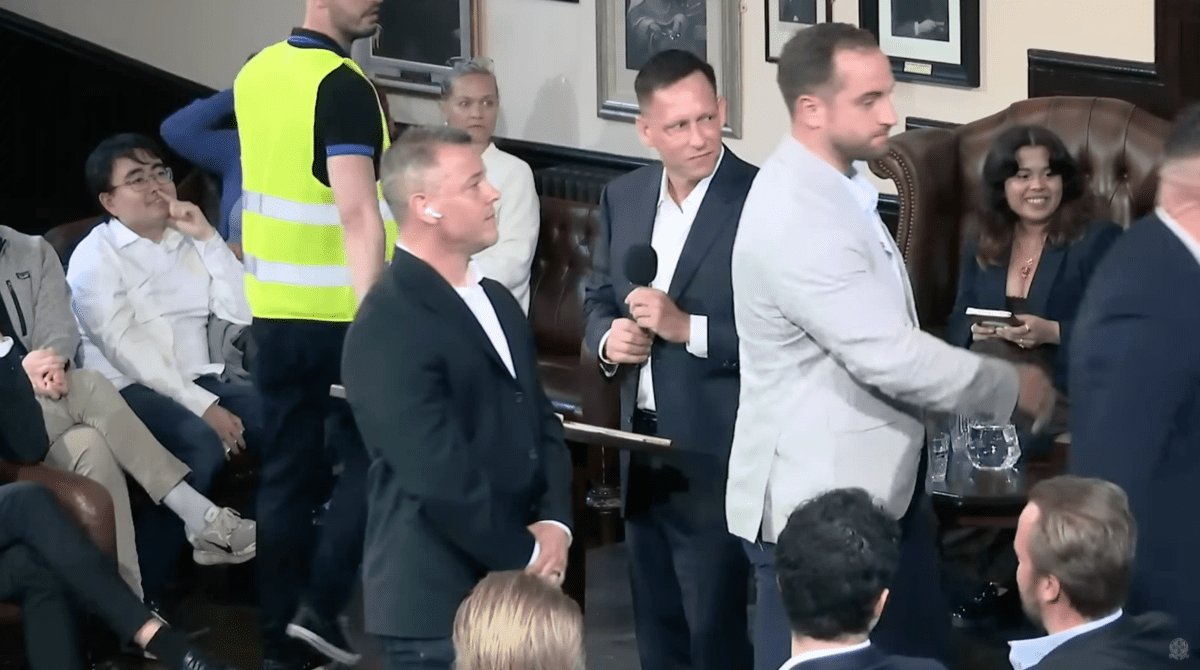
Thiel has never minded being seen as a villain. When he supported Trump in 2016, he said: "Silicon Valley wants a villain, and the Republican Party wants a hero." Obviously, he feels that this role suits him very well. When talking about "The Lord of the Rings" , he believed that the essence of elves are immortal humans, and then asked, "Why can't we become elves?" On the road to pursuing immortality, Till was often called a vampire by public opinion .
Peter Thiel believes that behind every successful company there is a "secret that is close at hand but no one realizes". What he pursues is "non-consensus", subversion and development. He believes that the United States today is stuck in an innovative stagnation and attributes the root cause of the problem to the pursuit of diversity in American society over the past few decades. He said: "We wanted flying cars, but we got 140 characters." .
However, Thiel is not a visionary like Steve Jobs, and he cannot give a clear direction for future development.
Many people who know Peter Thiel would say that he doesn’t know what he wants. Putting aside his philosophical thoughts, Thiel is indeed a super contradiction: he is gay, but he founded a right-wing newspaper to criticize multiculturalism and feminism during his time at Stanford; in "Zero to One", he promoted the company's monopoly model and He is an autocratic monarchy, but he openly opposes the monopolistic behavior of large technology companies; he advocates technological liberalism, but believes that democracy and freedom are incompatible with each other.
Peter Thiel is more like an igniter. He will try his best to change the development trajectory of a person, a company or even a society, but he will not be responsible for the consequences no matter where the ship turns. Founders Fund was one of the first institutions to leave Silicon Valley banks before they fell into crisis. In New Zealand, where the movie "Lord of the Rings" was filmed, Thiel spent millions of dollars to buy a 500-mile manor. In a 2016 interview, OpenAI CEO Sam Altman revealed that if a global disaster occurs, he will work with Thiel flew here together to seek refuge. Yes, if Peter Thiel really sets the world on fire, you'll probably have no way out, and he's already prepared a way out.
Woke, tycoon tax, Lina Khan, the "Biden totalitarianism" that makes Silicon Valley switch sides
In September 2021, the Washington Times published an article titled "The Overexpansion of Democratic Totalitarianism Is Threatening American Livelihoods ," accusing Democratic radicals of deliberately suppressing the voices of minorities in social public opinion and using science to enforce School policies that undermine parental rights and ignore the harm masks and gender identity education do to young children.
The term totalitarianism originates from Western descriptions of Nazi Germany, fascist countries, and the Soviet Union during the Cold War. Totalitarians suppressed opposition parties and controlled the public and private lives of citizens through state propaganda machines and mass media. In the early days of Biden's term, the term only occasionally appeared in conservative media such as the Washington Times and some far-right forums, arguing that political correctness, content censorship and big government were the "new totalitarianism" in the United States.
But in a podcast updated last week, a16z founding partner Ben Horrowitz also began to use the word "totalitarian" to describe Biden's Democratic administration. He believes that there has been a far-left force in the Democratic Party in the past four years. Biden’s appointees have seized on the regulatory vacuum and unleashed hostility toward Silicon Valley and the startups it invests in. This caused a16z, a past supporter of the Democratic Party, to side with Trump in this election.
At the Axios technology conference at the beginning of the year, Peter Thiel’s friend David Sachs, founder of Craft Ventures, also said that he had “bigger differences with Biden than with Trump.” Shortly after, he invited Trump to attend He co-hosts the well-known podcast All In Podcast.
Peter Thiel’s personal influence is certainly important, but Silicon Valley has never lacked kingmakers. Behind the successive defections of these powerful individuals is the erosion of efficiency in Silicon Valley under the influence of Woke culture, as well as Biden’s big government policies and The great conflict between the plutocracy.
"No, Mr. President, they are not your children."
"My son died," Elon Musk said in a live interview this week. "He was killed by the Woke-Mind virus (referring to Dead Naming)." During the interview, Musk openly discussed the fact that his eldest son was transgender. During the epidemic, Musk’s eldest son Xavier suffered from gender dysphoria. In the end, Musk, with incomplete information, expressed concern that Xavier might commit suicide. Worried, she signed the documents for her son’s gender reassignment surgery. Musk later blamed the issue on gender identity education in American schools.
A year ago, the White House’s official "You are the government. They are not your children." The voice in the video comes from remarks made by the Biden administration at the "White House Pride Month" event held that month. During the event, transgender model Rose Montoya's topless behavior in the White House sparked widespread media attention. A storm of public opinion .
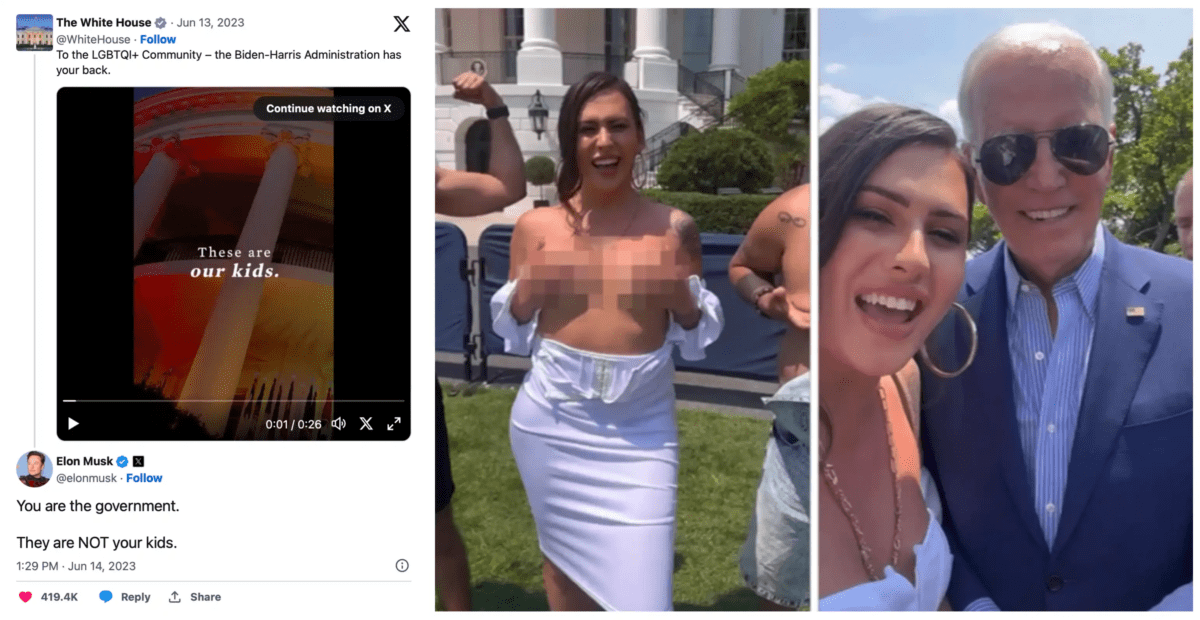
In the past two years, whether gender identity should be taught in primary and secondary schools, and whether schools are obliged to notify parents when students want to change their gender identity, has become one of the most controversial topics in American society.
During the 2022 midterm elections, Virginia Democratic gubernatorial candidate Terry McAuliffe threatened that parents should not be involved in K-12 public education, saying that he "would not let parents into schools, and parents should not tell schools that they should What to teach?" Conservatives have frequently opposed legislation. In March, Florida Governor Ron DeSantis signed a parental education rights law banning the state's public schools from teaching about gender in kindergarten through third grade. content, and it is up to parents to decide when to teach their children about such topics.
And polling data shows that most Americans, regardless of political affiliation, support the bill of rights. In multiple federal court cases, Florida parents have accused schools of following "gender support" programs that allowed students to choose pronouns or different gender identities without parental consent and helped students deceive parents or refuse to abide by their policies. Will.
In April of the same year, Biden spoke at the annual teachers event and said : "They are not other people's children. When they are in the classroom, they are just like your children." Then at the teachers event the following year, he emphasized again : " There is no concept of "other people's children." All the children in our country are our children." Biden's remarks were considered an attack on conservatives and the opposition movement of student parents. Right-wing media criticized this as "using "Woke". Loyalty to the cause replaces the bond between parents and children in order to achieve the goal of controlling the younger generation."
Starting from the MeToo movement, "woke culture" began to develop widely in the United States and reached its climax during the Black Life Matters movement. After Biden came to power, Woke culture began to develop to extremes. With the help of mainstream media such as CNN and social media platforms such as Twitter, it became a hyper-sensitive topic in public opinion. Subsequently, "Cancel Culture" became more It is regarded as a public opinion tool used by the far left to attack other social groups. During the epidemic, media reports such as CNN and MSNBC's coverage of riots in black communities were ridiculed by many American netizens . These reporters stood in front of the scene of the fire and described it as "a burning but basically peaceful protest."

On Wall Street, Woke culture has also caused dissatisfaction among some traditional leftists. In an interview earlier this year , "Small Stock God" Bill Ackman expressed his disappointment with the changes in the Democratic Party in the past few years, "Today if you If you say something that offends others, you may directly lose your job, you may be "cancelled"... I am a "Clinton-style Democrat" and I don't want to be associated with today's Democratic Party at all." That month, New York Magazine published an in-depth article titled " Bill Ackman's War with Harvard, MIT, and DEI ," which reported Bill's "big reckoning" with the MIT president and his wife for seeking public benefit through DEI. .
Under the leadership of the Biden administration, Woke culture has impacted American companies and startups in the form of the DEI movement (Diversity, Equity, and Inclusion), and the aversion to DEI has gradually become an open secret in Silicon Valley. Many Silicon Valley entrepreneurs and executives believe that the DEI program prevents companies from making the best decisions in recruitment and business cooperation, ultimately leading to a regression in corporate profitability. Some technology companies even try to abolish the DEI recruitment program. Last month, Scale AI founder Alexandr Wang published an article on X, replacing the DEI recruitment plan with the concept of MEI (ie, merit, excellence and intelligence), winning the support of technology giants such as Musk.

Peter Thiel has always been very high-profile on the "anti-DEI cause." He has publicly stated many times that "DEI is Comey." In a speech at the University of Cambridge this month, Thiel once again quoted his college book "The Mystery of Diversity" and pointed out that the DEI movement diverts people's attention from important issues such as economic development and technological innovation, leading to social inefficiency. of low.
According to the Washington Post, Thiel has focused on changing American culture since 2021 and has provided funds to "anti-Woke" causes, including right-wing film festivals and conservative dating apps. Musk called Woke culture the "Woke-Mind virus" and tried to maintain neutral public opinion by acquiring Twitter. This behavior received "spiritual support" from Thiel. The eldest son’s transgender incident deeply touched Musk, and he subsequently began to fiercely criticize California’s transgender medical policy for minors. The AB-1955 bill signed by California Governor Gavin Newsom was considered to be Musk’s announcement that he would The direct trigger for X and SpaceX’s headquarters to move out of California.
Big government gambles, tax wand hits Silicon Valley rich
After Biden took office, the U.S. federal government embarked on a "spending spree" and passed a $1.9 trillion economic rescue plan in the first year of his term. The Washington Post published an article titled " Biden is Betting on Bigger Things." Government, and the Epidemic is Helping Him " pointed out in the article that Biden is becoming a very ambitious president, and the federal government is undergoing the largest expansion in half a century.
With millions of Americans losing their jobs due to economic shutdowns and social unrest, public resistance to the expansion of big government has gradually softened. In a late February poll, the stimulus plan won about 65% of the public. support. Biden, for his part, is trying to quickly advance his big government agenda by using the current public sentiment as an opportunity for major expansion.
After entering the White House, Biden was described by the media as the vehicle for launching the second attempt at the Great Society program in American history. In the early 1960s, President Lyndon Johnson's Great Society program was seen as the federal government's last expansion attempt, but it eventually triggered a strong opposition movement under the pressure of the Vietnam War. After Reagan took office in the 1980s, he The anti-Washington sentiment set the political tone for anti-government expansion in the United States for decades to come. Yet Biden is betting that the pandemic can help him rewrite the script of history, allowing him to accomplish things that other Democratic presidents have been unable to do.
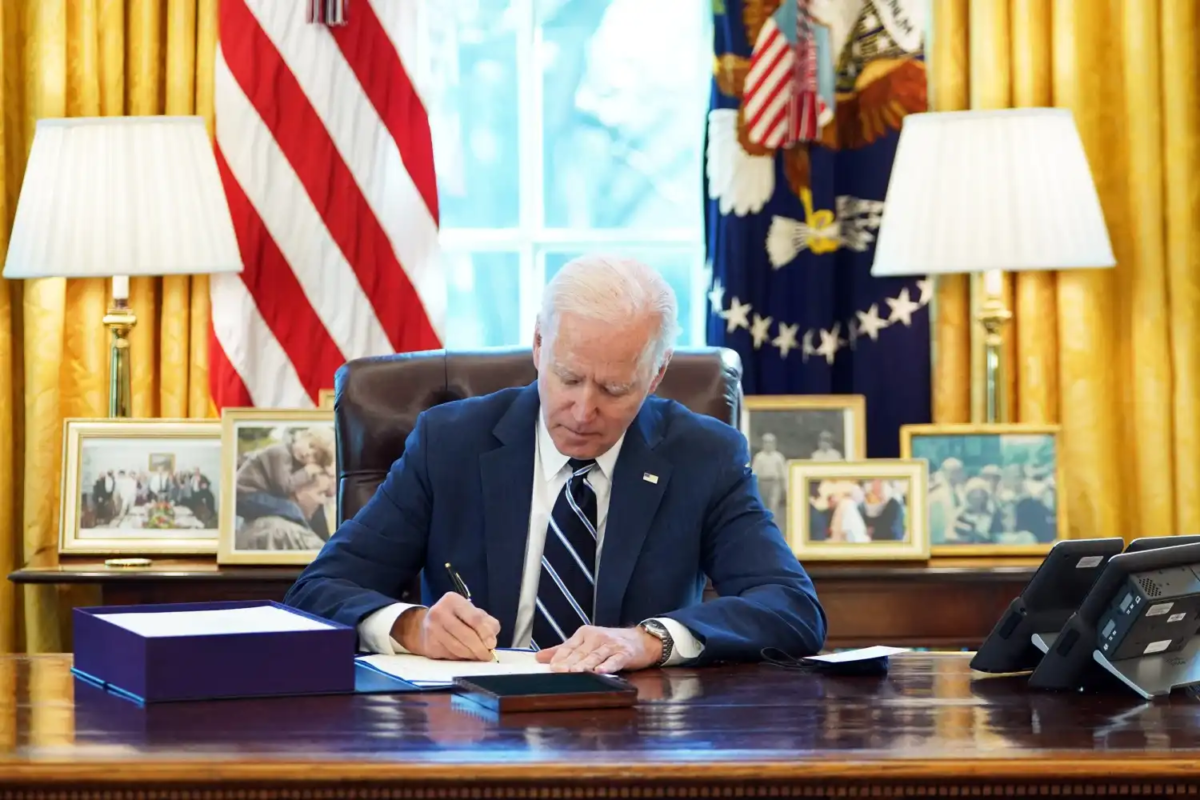
The following year, the Biden administration launched a $2 trillion large-scale infrastructure plan to support the "Build Back Better" agenda, further expanding the role of state funds in the social economy. In addition to social spending, Biden also significantly increased the defense budget during his term, raising defense spending to $800 billion in early 2023, an increase of 3.2% from the previous fiscal year. It was called the largest peacetime budget in U.S. history by the media. one of the largest annual defense budgets. At the same time, federal employees also received a 5.2% salary increase , which was the largest salary increase for US civil servants in 43 years since the 9.1% salary increase in 1980.
High spending means high taxes, and funding for a massive $2 trillion infrastructure program cannot rely solely on government debt. Biden decided to take action on American businesses and the wealthy class . The corporate tax, seen as a major source of funding for the White House's infrastructure plan, was raised from 21% to 28%, federal subsidies for fossil fuel companies were ended, the global minimum tax payment was raised from 13% to 21%, and multinational corporations were forced to pay US tax rate. This is the first time since 1993 that the U.S. federal government has significantly increased federal tax rates , directly reversing the trend of deep corporate tax cuts promoted by the Trump administration since 2017.
In addition, the wealthy class and investors are targeted for increased income to fund social priorities in infrastructure projects. When announcing the 2023 budget, Biden proposed a new tax plan for the wealthy, levying a 25% minimum income tax on citizens with a net worth of more than $100 million, including standard tax payable and "tradable assets" (including stocks) , bonds, mutual funds, and other securities, etc.). The plan, dubbed the "billionaire minimum income tax" by the White House, marks the first time the Biden administration has explicitly called for a wealth tax and is expected to bring $360 billion in revenue to the federal government over the next 10 years.
According to a report published by ProPublica in 2021, Biden's tycoon tax will cost technology giants such as Bezos and Musk $35 billion to $50 billion in taxes. That year, the news that "Musk will pay an $11 billion tax bill" became a hot topic, which was the largest single tax bill paid by an individual in U.S. history.
After raising the fiscal year 2025 budget to $7.3 trillion, Biden once again proposed a tax on unrealized gains and plans to impose unrealized gains on trusts, corporations and other non-corporate entities that have not had a recognition event in the past 90 years. Gains are taxed. Biden's proposal, signed into law, would make this conceptual measure almost never used in past U.S. tax frameworks due to the complexity of asset valuation and liquidity issues and the enormous challenges of implementation. The maximum marginal interest rate on long-term earnings and dividends increased to a jaw-dropping 44.6%, the highest level in U.S. history.
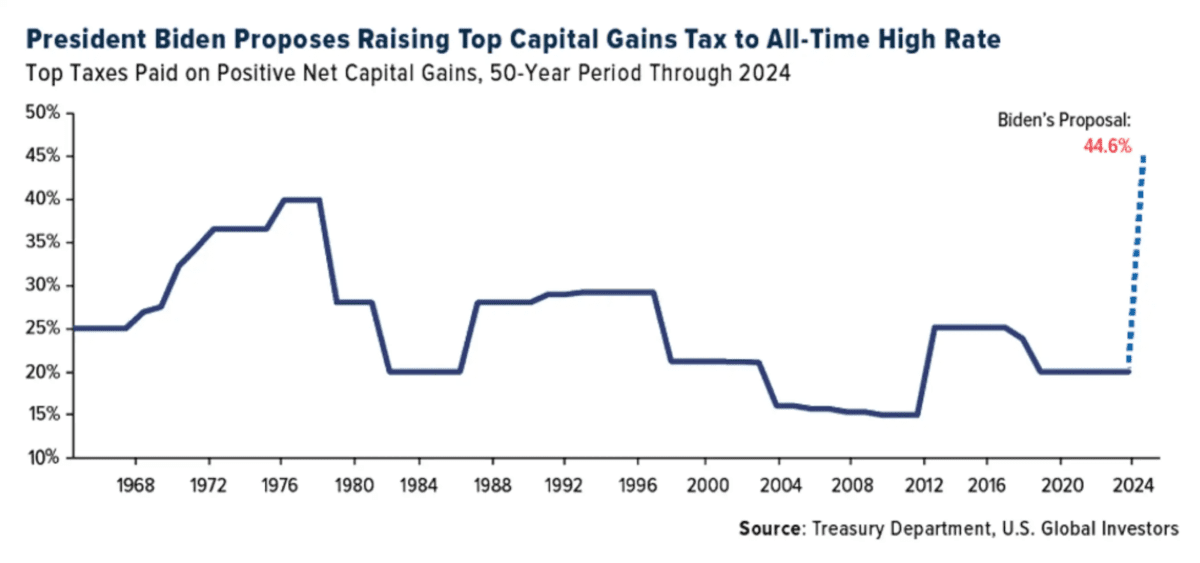
Taxing unrealized gains means that when the value of tradable assets such as stocks and bonds held by individuals or businesses (net worth greater than $100 million) increases in value, they need to pay a minimum income tax of 25%, even if these assets Not for sale yet. For the venture capital circle, which regards valuation growth as the underlying logic of everything, this is a declaration of war.
When talking about the tax plan, Bill Ackman said that the Democratic Party should not pursue a tax policy that "will destroy the American economy." "If someone injects capital into your startup at a valuation of $1 billion, and you have a company of 50 % of the shares, you will immediately incur $100 million in tax liability... All American startups will go bankrupt, and no one will want to start a business in the United States." In the latest podcast episode , the two founding partners of a16z also expressed the same view.
David Sacks said at a technology conference at the beginning of the year that this tax may kill the startup industry's system of providing stock options to founders and employees, saying that "this is an important reason for Silicon Valley to seriously consider who it should vote for." . The investment community believes that this tax policy will greatly distort the investment behavior of American investors, especially when it comes to small-cap stocks and start-up companies. These companies are often engines of economic growth and innovation, but they rely on investors willing to take risks for future returns. But when unrealized gains are also included in taxation, investors will no longer favor growth-oriented businesses because their valuations tend to be more volatile than those of larger, more established companies.
The unrealized gains tax faces opposition not only from the rich. A poll shows that more than two-thirds of U.S. citizens (including 76% of independent voters) reject such tax policies and believe that the federal government should not intervene. Private property. Some mainstream media believe that the currently severely divided Congress can hardly muster the votes needed to approve this policy.
Regulatory mafia: Beat big technology and strangle small technology
In 2007, Barack Obama and a group of Silicon Valley CEOs held a private dinner in Woodside, California. During the dinner, then-Apple CEO Steve Jobs secretly showed Obama a copy of the original iPhone. prototype, the former Democratic president joked on the spot: "If it were legal, I would buy a boatload of Apple stock. This thing will be very big."
Over the past decade, the Silicon Valley technology industry has had close ties with Democrats. For example, former Democratic Vice President Al Gore joined the venture capital firm Kleiner Perkins in 2007, and later joined Apple, Google, Airbnb and Uber. Many technology companies employ large numbers of former members of the Obama administration.

However, under Biden, the ambiguous relationship between Silicon Valley and the White House has suddenly cooled down, and the government's attitude towards big technology has become very tough. Many venture capital practitioners believe that the Democratic Party under the Biden administration has further shifted to the left and "demonized" successful entrepreneurial tycoons, leading to a further alienation from the technology industry because "no one likes to be told over and over again that they are evil." of". In May of this year, Sequoia Capital partner Shaun Maguire publicly accused Biden of "double standards" in his career on X.
To the dismay of Silicon Valley, Biden’s pick for Federal Trade Commission (FTC) chairperson Lina Khan has been actively blocking mergers and acquisitions by large companies . After 2022, the start-up industry has fallen into a downturn and high interest rates have reduced capital. Fleeing from high-risk areas, coupled with the poor environment of the IPO market, makes mergers and acquisitions one of the few exit opportunities in the venture capital industry. In addition, many Silicon Valley venture capital forces are dissatisfied withthe hostility of Gary Gensler, Biden’s pick as chairman of the Securities and Exchange Commission (SEC), towards cryptocurrency companies.
After Biden came to power, cracking down on the monopoly behavior of large technology companies has become an important issue. From Apple, Amazon to Google, almost all Silicon Valley giants have been spared. When he signed the Enterprise Competition Act in July 2021, he said that "capitalism without competition is not capitalism" and directly or indirectly appointed Lena Khan, Gary Gensler, and Jonathan Kanter, etc. Spearhead figure.
In Silicon Valley, Lena Khan has become the only supervillain who can unite everyone. According to Puck , although executives are divided on supporting factions, anger towards Khan is a common theme among all. In their view, there is no need for Lena to aggressively kill the merger and reduce the competitiveness of American companies. .
Lena Khan, a graduate of Yale Law School, is the first person of South Asian descent to lead the Federal Trade Commission. At only 35 years old, she is also the youngest chairperson in the history of the FTC. In 2017, Lena published an article in the Yale Law Journal titled " The Amazon Antitrust Paradox ," arguing that Amazon is a monopoly and explaining why she believes U.S. regulation of big business is failing. The article attracted huge attention in both academic and political circles, and directly pushed Lena Khan to the center of the U.S. business antitrust struggle.
After Biden took office, he appointed young Lena Khan as FTC chairperson. In September of the following year, the FTC joined more than a dozen states to sue Amazon , accusing it of engaging in illegal business practices that enabled it to exercise monopoly power. A few months later, the FTC filed a series of lawsuits against Google and Meta, hoping to remove ownership of Instagram and Whatsapp in the Meta case. In March of this year, the FTC once again launched an attack on big technology, suing Apple for abusing its iPhone monopoly. Apple stated in a subsequent public statement that the FTC’s lawsuit “threats who we are” and, if successful, will “create a Dangerous precedent gives governments the ability to have a greater say in designing general-purpose technologies."
After being sued by the FTC in 2022, Nvidia gave up its $40 billion acquisition of chip design company Arm Holdings. This was originally what SoftBank President Masayoshi Son wanted to see most. However, this "antitrust pioneer" has also lost several battles in the war with giants, including preventing Microsoft from acquiring Activision Blizzard, and preventing Meta from acquiring virtual reality startup Within.
Regardless, aggressive antitrust policy has become one of the defining features of the Biden administration, and Biden and Khan’s larger agenda is to recalibrate the federal government’s stance on corporate competition in a way not seen in decades. Everyone knows that if Biden is re-elected, regulatory pressure will undoubtedly continue.

In the cryptocurrency space, where Marc Andreessen’s a16z and Peter Thiel’s Founders Fund are betting heavily, hostility from the SEC has also become a major problem. From 2020 to 2022, the SEC successively sued Ripple, Coinbase, BlockFi, Kraken and other encryption companies for unregistered securities, and requested settlement fees of 30 million to 100 million US dollars. In the Binance case, this The total cost reached an astonishing US$4.3 billion. After the FTX thunderstorm in November 2022, Gensler regarded it as a case of killing a chicken to scare the monkeys, and made multiple accusations against SBF, which was called a " witch trial " by the media.
Around 2023, the SEC shifted its regulatory focus to crypto staking services. In March, it issued a Wells Notice to Coinbase. In its lawsuit in June, it stated that Coinbase's staking service plan was unregistered and classified as securities. , in the same month, the SEC once again sued the Ethereum staking protocols Lido and Rocket Pool on this basis. Since the beginning of this year, the SEC’s hostility towards cryptocurrencies has become increasingly clear. Between April and May, it sent Wells notices to three crypto and crypto-related companies: Uniswap, ConsenSys, and Robinhood. This was reported by a16z founding partner Ben Holloway. Ben Horrowitz called it a "nuclear bombing" of the industry.
In addition, the Biden administration appears to be blocking funding channels for banks and crypto companies through a cross-agency coordinated plan dubbed "Operation Choking Point 2.0" by the industry.
From December 2022 to January 2023, crypto-friendly banks including Signature, Silvergate, Custodia, Metropolitan Commercial, etc. have successively reduced or shut down crypto-related businesses, and were refused by the Federal Reserve to join them on the grounds of "safety and soundness." Application to the federal system. The U.S. National Economic Council (NEC) issued a policy statement strongly recommending that banks not trade directly with cryptocurrency assets or maintain exposure to cryptocurrency depositors.
In March, Silicon Valley Bank (SVB) was hit hard, implicating several banks in bankruptcy and liquidation, with the main targets being crypto-friendly banks such as Signature and Silvergate. According to Barron’s , about 20% of Signature’s deposits come from crypto companies. After the bank goes bankrupt, crypto companies will have difficulty finding alternative liquidity providers, and the entire industry will face huge difficulties in deposits and withdrawals. Former Signature Bank board member Barney Frank has publicly stated that Signature was liquidated because regulators "wanted to send a very strong anti-crypto message."
Soon after, the SEC issued SAB121 (Staff Accounting Bulletin No. 121), which requires entities that perform crypto asset custody activities to record asset value fluctuations in their balance sheets. This means that if the price of Bitcoin falls, banks are responsible for users' losses, forcing banks to stay away from crypto custody business. In April this year, the anti-SAB121 bill passed the Senate and the House of Representatives with the joint efforts of both parties, but was ultimately vetoed by Biden.
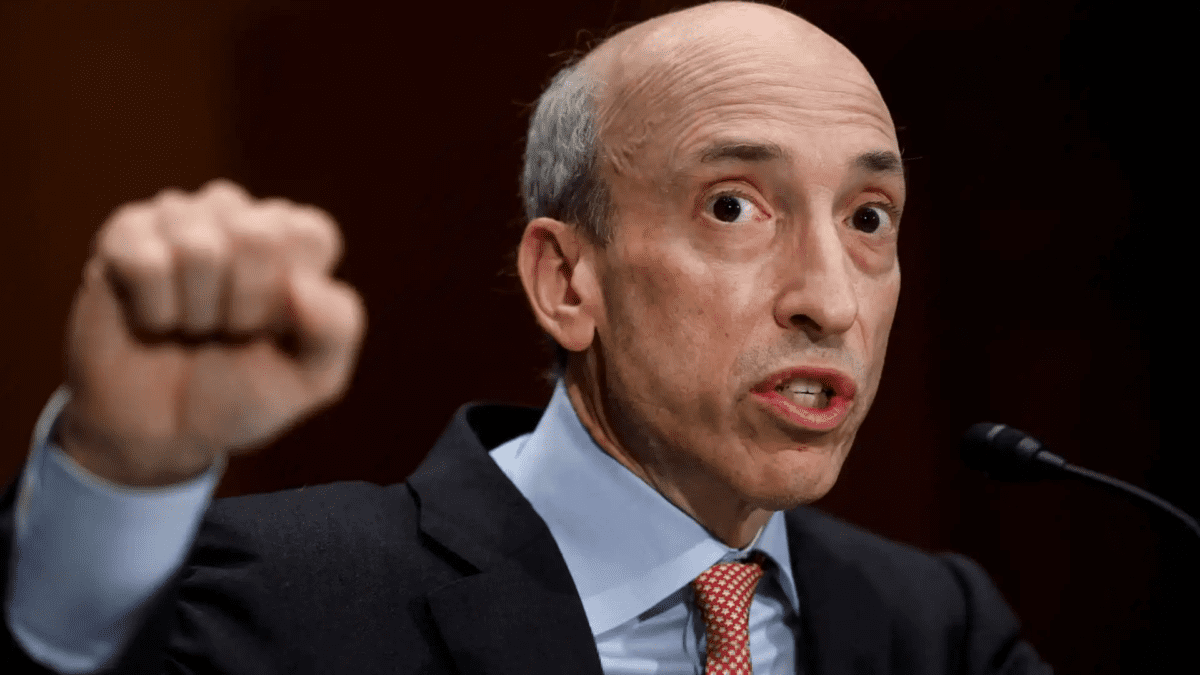
In February last year, after the SEC adjusted regulatory rules regarding investment adviser protection, a16z accused in an open letter that the new regulations would prevent RIAs (registered investment advisers) from holding and trading crypto assets for clients. Ben Horowitz said in a recent podcast that more than 30 companies in a16z’s investments have received Wells notices from the SEC in the past two years. One of the microfinance startups suddenly received the FDIC notice after the epidemic. "This is something I have never seen in my career. Startups simply don't have the money to fight the government," Horowitz said in the podcast .
From the US$2 trillion infrastructure plan to the establishment of 31 state innovation centers to antitrust competition







